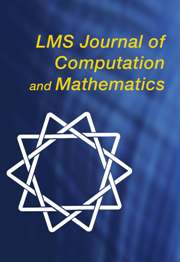Crossref Citations
This article has been cited by the following publications. This list is generated based on data provided by Crossref.
Roberts, David P.
2015.
Advances in the Theory of Numbers.
Vol. 77,
Issue. ,
p.
169.
Schaeffer, George J.
2015.
Hecke stability and weight $$1$$ 1 modular forms.
Mathematische Zeitschrift,
Vol. 281,
Issue. 1-2,
p.
159.
Wong, Siman
2016.
The maximal unramified extensions of certain complex Abelian number fields.
Publications mathématiques de Besançon. Algèbre et théorie des nombres,
p.
93.
Cohen, Henri
and
Thorne, Frank
2016.
Dirichlet series associated to quartic fields with given cubic resolvent.
Research in Number Theory,
Vol. 2,
Issue. 1,
Malmskog, Beth
and
Rasmussen, Christopher
2016.
Picard curves over with good reduction away from 3.
LMS Journal of Computation and Mathematics,
Vol. 19,
Issue. 2,
p.
382.
DEMBÉLÉ, LASSINA
DIAMOND, FRED
and
ROBERTS, DAVID P.
2016.
SERRE WEIGHTS AND WILD RAMIFICATION IN TWO-DIMENSIONAL GALOIS REPRESENTATIONS.
Forum of Mathematics, Sigma,
Vol. 4,
Issue. ,
Dummit, David S.
and
Kisilevsky, Hershy
2017.
Decomposition types in minimally tamely ramified extensions of $$\mathbb {Q}$$ Q.
Research in Number Theory,
Vol. 3,
Issue. 1,
König, Joachim
2017.
On rational functions with monodromy group M11.
Journal of Symbolic Computation,
Vol. 79,
Issue. ,
p.
372.
Dujella, Andrej
Kazalicki, Matija
Mikić, Miljen
and
Szikszai, Márton
2017.
There Are Infinitely Many Rational Diophantine Sextuples.
International Mathematics Research Notices,
Vol. 2017,
Issue. 2,
p.
490.
Jones, John W.
and
Roberts, David P.
2017.
Artin L-functions of small conductor.
Research in Number Theory,
Vol. 3,
Issue. 1,
Roberts, David P.
2017.
Lightly ramified number fields with Galois group S.M 12 .A.
Journal de théorie des nombres de Bordeaux,
Vol. 28,
Issue. 2,
p.
435.
Roberts, David P.
2018.
PGL2(𝔽ℓ) number fields with rational companion forms.
International Journal of Number Theory,
Vol. 14,
Issue. 03,
p.
825.
Jones, John W.
and
Roberts, David P.
2018.
Mixed degree number field computations.
The Ramanujan Journal,
Vol. 47,
Issue. 1,
p.
47.
Logan, Adam
2018.
New realizations of modular forms in Calabi–Yau threefolds arising from ϕ4 theory.
Journal of Number Theory,
Vol. 184,
Issue. ,
p.
342.
Thilmany, François
2019.
Lattices of minimal covolume in SLn(R).
Proceedings of the London Mathematical Society,
Vol. 118,
Issue. 1,
p.
78.
Driver, Eric D.
and
Jones, John W.
2019.
Computing septic number fields.
Journal of Number Theory,
Vol. 202,
Issue. ,
p.
426.
Brumer, Armand
Pacetti, Ariel
Poor, Cris
Tornaría, Gonzalo
Voight, John
and
Yuen, David
2019.
On the paramodularity of typical abelian surfaces.
Algebra & Number Theory,
Vol. 13,
Issue. 5,
p.
1145.
Freitas, Nuno
Kraus, Alain
and
Siksek, Samir
2020.
Class field theory, Diophantine analysis and the asymptotic Fermat's Last Theorem.
Advances in Mathematics,
Vol. 363,
Issue. ,
p.
106964.
Mantilla-Soler, Guillermo
and
Rivera-Guaca, Carlos
2020.
A proof of a conjecture on trace-zero forms and shapes of number fields.
Research in Number Theory,
Vol. 6,
Issue. 3,
Bouw, Irene I.
Koutsianas, Angelos
Sijsling, Jeroen
and
Wewers, Stefan
2020.
Conductor and discriminant of Picard curves.
Journal of the London Mathematical Society,
Vol. 102,
Issue. 1,
p.
368.


